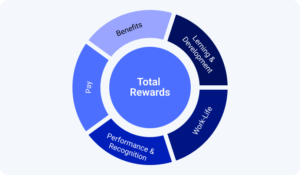What are the Total Reward Elements? I am often asked by my clients this question. Compensation is not just base salary; it is so much more. Compensation refers to employees’ total rewards for their work and contribution to an organization. It goes beyond just the basic salary or wages and includes various elements that comprise the overall compensation package. The details of compensation can vary depending on the organization’s policies, industry, and country, but they typically include the following:
- Base Salary/Wages: The fixed amount paid to employees for their regular work hours.
- Incentive Pay/Bonus: Incentive pay, such as performance-based bonuses or commissions, is provided to employees as a reward for achieving specific goals or exceptional performance. These bonuses can be tied to individual, team, or company performance metrics.
- Benefits: Employee benefits are additional non-cash rewards the employer provides to support employees’ well-being and financial security. Typical benefits include health insurance, retirement plans (e.g., 401(k)), life insurance, disability insurance, paid time off (vacation, sick leave), and parental leave.
- Stock Options/Equity: Some companies offer employees the opportunity to own a stake in the organization through stock options or equity grants.
- Profit-Sharing: Profit-sharing programs distribute a portion of the company’s profits among eligible employees. This motivates employees to work toward the company’s success and aligns their interests with those of the organization.
- Non-Monetary Recognition: Recognition and appreciation for employees’ contributions can be provided through non-monetary rewards like certificates, plaques, public acknowledgment, or Employee of the Month programs.
- Perks and Allowances: Some companies offer additional perks or allowances, such as company cars, meal allowances, gym memberships, transportation subsidies, or mobile phone allowances.
- Long-Term Incentives: In addition to stock options, long-term incentives may include performance-based grants or deferred compensation plans that reward employees for their commitment to the organization over an extended period.
- Career Development and Training: Offering opportunities for skill development, training, and career advancement can be considered part of the compensation package, as it enhances an employee’s value and potential for growth within the organization.
- Work-Life Balance Initiatives: Organizations may implement policies and practices that support work-life balance, such as flexible working hours, remote work options, or family-friendly benefits.
It’s essential for organizations to design a well-balanced total rewards package that aligns with their business goals, attracts and retains talent, and motivates employees to perform at their best. Different individuals may value other compensation elements, so offering a diverse range of rewards can be beneficial in meeting the needs and preferences of employees.
Re: SHRM.org

